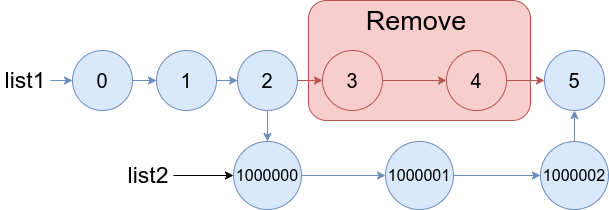Problem: You are given two linked lists: list1 and list2 of sizes n and m respectively. Remove list1's nodes from the ath node to the bth node, and put list2 in their place.
The blue edges and nodes in the following figure indicate the result:

Build the result list and return its head.
Example:

Input: list1 = [0,1,2,3,4,5], a = 3, b = 4, list2 = [1000000,1000001,1000002] Output: [0,1,2,1000000,1000001,1000002,5] Explanation: We remove the nodes 3 and 4 and put the entire list2 in their place. The blue edges and nodes in the above figure indicate the result.

Input: list1 = [0,1,2,3,4,5,6], a = 2, b = 5, list2 = [1000000,1000001,1000002,1000003,1000004] Output: [0,1,1000000,1000001,1000002,1000003,1000004,6] Explanation: The blue edges and nodes in the above figure indicate the result.
Constraints:
- 3 <= list1.length <= 104
- 1 <= a <= b < list1.length - 1
- 1 <= list2.length <= 104
Approach: The approach is straight forward. We will store the (a - 1)th node and (b + 1)th node of list1. Now we can put list2 to the next of (a - 1)th node of list1. We traverse the whole list2 and in the end we will put the stored (b + 1)th node of list1 to the next of end of list2 and that's all.
Implementation in C#:
public ListNode MergeInBetween(ListNode list1, int a, int b, ListNode list2)
{
ListNode node = list1;
ListNode mergeStartNode = null;
for (int i = 0; i <= b; ++i)
{
if (i == a - 1)
{
mergeStartNode = node;
}
node = node.next;
}
ListNode mergeEndNode = node;
mergeStartNode.next = list2;
node = list2;
while (node.next != null)
{
node = node.next;
}
node.next = mergeEndNode;
return list1;
}
Complexity: O(n)
No comments:
Post a Comment